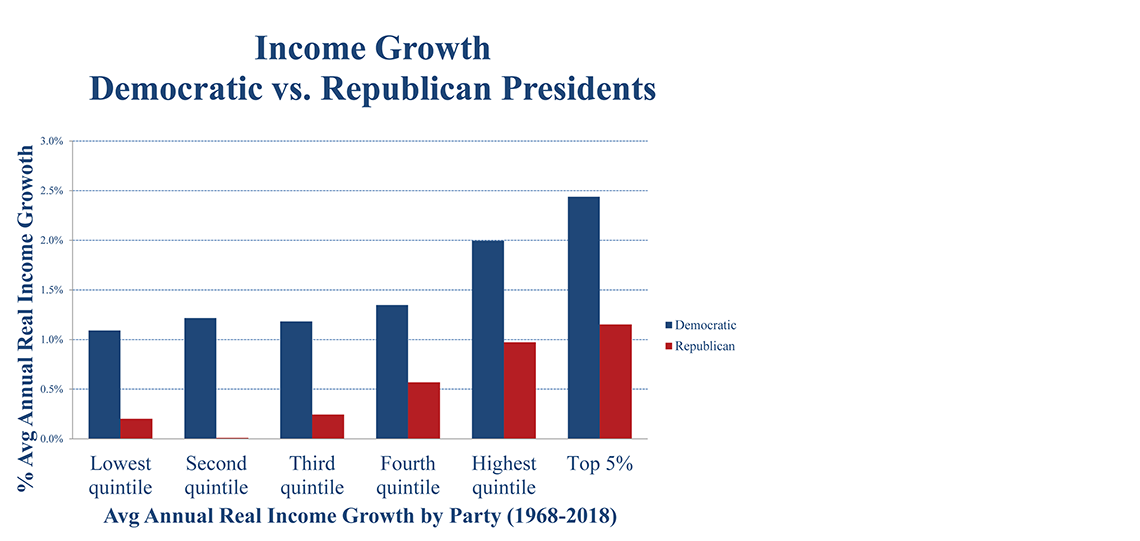Jobs & the Economy

Throughout the 117th Congress, House Democrats have partnered with President Biden to enact policies that expand economic opportunity for businesses, workers, and communities across America. Under President Biden and Congressional Democrats, the unemployment rate is at its lowest in more than 50 years with more than 10 million jobs created, helping more of our people get ahead in today’s economy and Make It In America.
Democrats pursue an economic agenda that helps American businesses create good-paying jobs and ensure that workers have the tools not only to get by but to get ahead in our global economy. From raising the minimum wage to providing skills training and apprenticeship opportunities to ensuring equal pay for equal work, from making childcare more affordable to making it easier to save for retirement, Democrats’ economic policies are aimed at helping workers and their families attain real economic security at every stage of life.
Democrats have also delivered historic legislation investing in infrastructure and greater access to high-speed internet, taking the lead in the clean-energy economy, and supporting innovation and entrepreneurship. The generational Bipartisan Infrastructure Law has already begun to expand economic opportunity for Americans in communities across the country and takes action to repair our nation’s roads, bridges, ports, and other infrastructure while creating nearly 1.5 million jobs annually over the next decade. It contains the first major American investment in climate resilience to help communities upgrade their critical infrastructure and mitigate the impact of climate change-driven extreme weather. Likewise, the Inflation Reduction Act also advances America’s clean energy goals, turbocharging clean energy research and transmission while promoting electric vehicle domestic manufacturing to reduce American dependence on gasoline while revitalizing our auto industry.
The CHIPS and Science Act includes bipartisan measures to revitalize the domestic semiconductor industry and spur research. By strengthening domestic supply chains, this law acts directly to accelerate American innovation in the long-term while acting immediately to address inflation and create good paying jobs. House Democrats will continue to champion skills training and education at every level – from early childhood learning through higher education – to prepare our people for success and advancement in a changing economy. In all of these efforts, Democrats will continue to look for ways to make access to opportunities more equitable and to combat the lingering effects of legalized discrimination that continue to make it harder for minorities to access credit for loans, seek investment capital for startups, and build wealth to pass on to the next generation.
With historic job creation under President Biden, House Democrats will continue to advance policies that expand economic opportunity for working families, support small businesses, and create better-paying jobs.
According to a Bloomberg poll released today, 8 in 10 Americans want Republicans and Democrats to reach a compromise on spending cuts. Democrats agree that we need to cut and compromise on spending so that we can reduce the deficit while protecting investments that grow the economy and create jobs. That’s why Democrats have moved halfway to Republicans’ $100 billion demand. But Republicans have ignored the message Americans are sending, and have not moved an inch from their one and only proposal.
Democrats are committed to restoring fiscal discipline and cutting spending, and the bill introduced today will provide another tool for us to do that. Under expedited rescission, Congress and the President can work together to cut wasteful, duplicative spending. I hope my Republican colleagues back up their calls for reduced spending with action and join us in moving this bill forward.
House Minority Whip Steny Hoyer (D-Md.) said Tuesday Democrats have come “more than halfway" in negotiations to cut billions of dollars in federal spending this fiscal year — and Republicans have not budged “a single inch.”
While Democrats have put forward a compromise measure cutting $51 billion of the $100 billion in cuts proposed by Republicans, House Republicans seem to have taken “March Madness” to heart and have so far refused to offer anything other than their irresponsible “So Be It” Spending Bill. Rather than move toward a compromise with Democrats, Republicans have not moved an inch from their arbitrary spending proposal that cuts investments in our future, harming economic growth and costing at least 200,000 jobs according to Federal Reserve Chairman Ben Bernanke and up to 700,000 jobs according to Moody Analytics’ Mark Zandi.
Today’s news on job creation is encouraging: our country added 192,000 jobs last month. Our unemployment rate is now 8.9%—and in recent months, the unemployment rate has declined at the fastest pace in almost 28 years. While these numbers are signs of an economy regaining its health, they also remind us that millions of Americans are still out of work and that more needs to be done.
U.S. Rep. Steny H. Hoyer (D-Md., 5th) made a quiet but important trip through Charles County last week, spreading the word about the initiative "Make It in America."
Tomorrow, the Department of Labor will release its report on February’s employment numbers. And while we don’t yet know the results, one thing is certain: if the news is good, Republicans will try to take credit for it. It’s just as certain that they will have no basis in fact for doing so. As this Congress approaches the two-month mark, Republicans have yet to offer a single piece of job-creating legislation.
With a federal budget battle showdown underway, science looks like collateral damage, say former federal officials, with proposed cuts to research that they consider severe. At stake, they warn, is the nation's long-term economic growth.
Federal Reserve Chair Ben Bernanke said Wednesday that House GOP’s 2011 spending plan would likely cost “a couple hundred thousand jobs,” a number he called “not trivial.”
We’re going to be doing a lot of deficit cutting over the next several years. The country’s future greatness will be shaped by whether we cut wisely or stupidly. So we should probably come up with a few sensible principles to guide us as we cut.